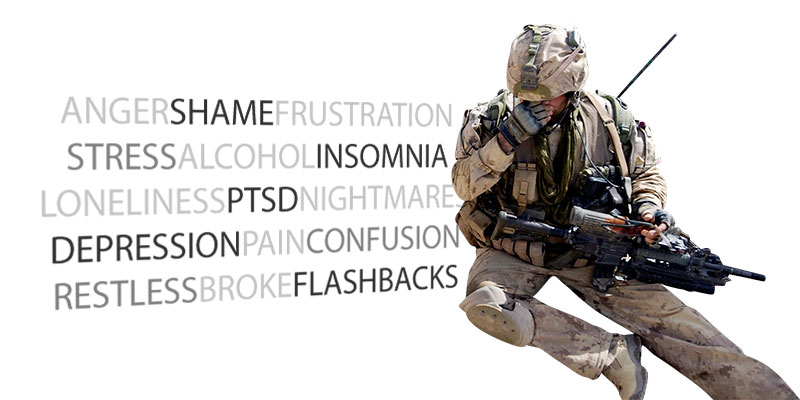What are the symptoms of veteran substance abuse?
Decreased interest in personal hygiene and appearance
Abnormal behavioral responses
Abnormal mood swings
Unexplained weight loss
Lethargy and/or excessive sleepiness
Sores on the face or mouth
Watery or red eyes
Giving up cherished activities
Withdrawing from company
Secretive behavior
Spending money without being able to account for the expenses
Alcohol and illicit drugs produce temporary feelings of euphoria. It is this euphoric “high” that users crave. But as the effects of the substance wear off, so do the pleasant feelings. Users may experience depression, apathy, and listlessness. Chronic substance abuse alters brain chemistry and functionality, so long-time users may exhibit lasting behavioral and mood changes.
Addicts are often preoccupied with procuring the substances that they are addicted to. They spend a large part of the day consuming these substance and then dealing with the withdrawal symptoms and then getting another high. This is a vicious cycle. The addict has no inclination, interest, or energy left to engage in hobbies or interact with friends and family members.
Secretive behavior such as lying about consumption habits, hiding away the substance of abuse, or spending money without being able to provide a satisfactory explanation for the expenses are tell-tale signs of substance abuse.
However, symptoms like weight loss, insomnia, lethargy, or sores on the face or mouth can also be caused by some underlying physical disorder. So it always makes sense to investigate.
Not everybody will exhibit all the classic symptoms of drug abuse. Nor will the signs appear simultaneously. Be proactive in trying to help those in your life.
Where To Find Help For Veteran Substance Abuse
thank you veterans
A veteran with SUD has multiple treatment options and avenues to explore, including the U.S. Department of Veterans Affairs Medical Centers, private addiction treatment and rehabilitation centers, addiction counselors, and mental health counselors.
The Department of Veterans Affairs (VA) Medical Center: Every VA medical center has health officers who can diagnose SUD and suggest an appropriate course of treatment. In addition, SUD-PTSD specialist who is trained to recognize and treat the symptoms of both these conditions are available to help find the best treatment options. Here treatment is provided under the Veterans Alcohol and Drug Dependence Rehabilitation Program. However, a veteran must be enrolled in the VA health care system in order to benefit from this program.
Private Addiction Treatment and Rehabilitation Centers: Many veterans choose to seek treatment at private inpatient or outpatient facilities that offer anonymity and guarantee confidentiality.
Addiction Counselor: An addiction counselor can help identify the best course of treatment. Some veterans may need to undergo detoxification before they can enter a rehabilitation center. The presence of co-occurring mental and substance abuse disorders may necessitate more specialized treatment, and an addiction counselor can help identify the proper course of treatment as well as a rehabilitation facility that is properly equipped to deal with both issues.
Mental Health Counselor: The presence of a mental disorder in veterans increases their risk of developing SUD. Proper treatment of PTSD and other mental health issues can help avoid SUD.
Ongoing counseling for post-traumatic stress disorder is also typically needed for those with symptoms of this disorder. Treatment usually includes therapy with a trained counselor with experience in treating post-traumatic stress, and sometimes medications to help alleviate anxiety.
If you or a loved one are trying to cope with a substance abuse problem, help is available. Learn about the Veteran Substance Abuse Problem.

